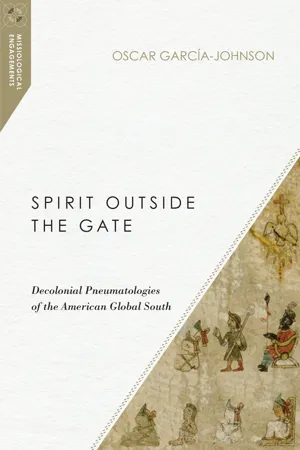
Spirit Outside the Gate
Decolonial Pneumatologies of the American Global South
- 328 pages
- English
- ePUB (mobile friendly)
- Available on iOS & Android
About This Book
Throughout the history of the Christian church, two narratives have constantly clashed: the imperial logic of Babel that builds towers and borders to seize control, versus the logic of Pentecost that empowers "glocal" missionaries of the kingdom life. To what extent are Westernized Christians today ready for the church of the Pentecost narrative? Are they equipped to do ministry in different cultural modes and to handle disruption and perplexity? What are Christians to make of the Holy Spirit's occasional encounters with cultures and religions of the Americas before the European conquest?Oscar García-Johnson explores a new grammar for the study of theology and mission in global Christianity, especially in Latin America and the Latinx "third spaces" in North America. With an interdisciplinary, "transoccidental, " and narrative approach, Spirit Outside the Gate offers a constructive theology of mission for the church in global contexts.Building on the familiar missiological metaphor of "outside the gate" established by Orlando Costas, García-Johnson moves to recover important elements in ancestral traditions of the Americas, with an eye to discerning pneumatological continuity between the pre-Columbian and post-Columbian communities. He calls for a "rerouting of theology"—a realization that theology cannot make its home in Christendom but is a global creation that must come home to a church without borders.In this volume García-Johnson- considers pneumatological insights into de/postcolonial studies- traces independent epistemic contributions of the American Global South- shows how American indigenous, Afro-Latinx, and immigrant communities provide resources for a decolonial pneumatology- describes four transformations the American church must undergo to break free from colonial, modernist, and monocultural structuresSpirit Outside the Gate opens a path for a pneumatological missiology that can help the church act as a witness to the gospel message in a postmodern, postcolonial, and post-Christendom world.Missiological Engagements charts interdisciplinary and innovative trajectories in the history, theology, and practice of Christian mission, featuring contributions by leading thinkers from both the Euro-American West and the majority world whose missiological scholarship bridges church, academy, and society.
Frequently asked questions
Information
PART I
The Narrative
The American Global South:
Challenges and Visions
JUSTICE AGAINST EPISTEMICIDE
1
A Child of the Occident
When . . . Jehovah distributed the world United Fruit Inc. reserved . . . America’s sweet waist. It rebaptized [them] The “Banana Republics.” PABLO NERUDA, “CANTO GENERAL” (1950) |
A CHIQUITA BANANA KID
A WESTERN CATHOLIC
THE PROTESTANT ENCHANTMENT
Table of contents
- Cover
- Title Page
- Dedication Page
- Contents
- Preface - An Amorphous Journey in Transoccidental Studies
- Acknowledgments
- Introduction
- Part I - The Narrative - The American Global South: Challenges and Visions
- Part II - The Gate - The Geopolitics of Western Theology and Mission
- Part III - Outside the Gate - In Search of Ungating Christian Logics in the American Global South
- Part IV - Theology Otherwise - Decolonial Pneumatologies in the American Global South
- Part V - Crossings - Perspectives on Theology, Whiteness, and Global Designs
- Epilogue - ¿Y Ahora Qué? - Can the “White Western” University Be Freed? (An Indiscreet Email)
- Bibliography
- Author Index
- Subject Index
- Scripture Index
- Notes
- Praise for Spirit Outside the Gate
- About the Author
- More Titles from InterVarsity Press
- Copyright